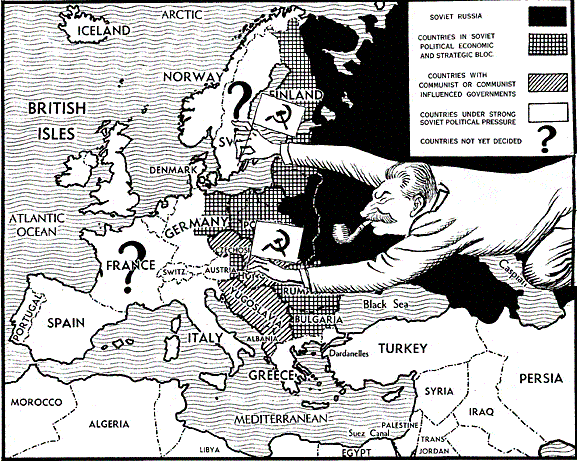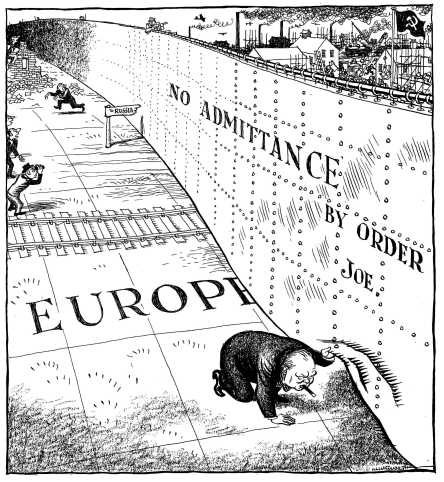One of the main topics for post-war history has been who’s responsible for the beginning of the Cold War – U.S., Soviet Union, or both? I’d like to throw a fourth option into the mix: Britain.
The U.S., according to revisionist historians, is said to have started the Cold War because of the following actions:
1. During World War 1, an Allied invasion of Russia during their revolution was aimed at stopping the Bolsheviks and restoring the Tsar to the throne. We also withheld recognition of the Soviet Union until 1933;
2. At the Potsdam Conference, Harry Truman withheld the information about the atomic bomb from Stalin but not Churchill. Even though Stalin knew about the bomb from spies, the atomic secrets were withheld from the Soviets and not the British;
3. George Kennan, an American diplomat, stated early in 1946 that the Soviet Union has only one concern: world domination, and that they understand power and strength and don’t respect weakness. This sets up the Cold War policy of containment – keeping the Communists from taking over other countries. This also became the Truman Doctrine in 1947;
“One way of life is based upon the will of the majority, and is distinguished by free institutions, representative government, free elections, guarantees of individual liberty, freedom of speech and religion, and freedom from political oppression.
The second way of life is based upon the will of a minority forcibly imposed upon the majority. It relies upon terror and oppression, a controlled press and radio; fixed elections, and the suppression of personal freedoms” – Harry Truman, 1947.
4. When the Soviets blockaded West Berlin in 1948, the British and U.S. violated the blockade by sending in thousands of supply flights to help save the West Berlin people;
5. In 1949, western European powers and the U.S. and Canada formed NATO in order to defend themselves against Soviet or Eastern European attack;
6. In 1952, we detonated a hydrogen bomb before the Soviets, escalating the arms race.
The Soviets, on the other hand, had started the Cold War, according to consensus historians, because:
1. They violated the Yalta Agreement by not allowing free elections in Eastern Europe after the war. Many of the Communist parties in those countries got financial support from the Soviet Union;
2. The Eastern European countries were controlled by the Soviets after World War 2;
3. The Soviets put down a democratic revolution in Czechoslovakia in 1948;

4. The Soviets blockaded West Berlin when the British, French, and American parts of West Germany formed to make their own government;
5. Stalin made a speech in 1946 in which he stated that Communism and capitalism are incompatible –
“Our Marxists declare that the capitalist system of world economy conceals elements of crisis and war, that the development of world capitalism does not follow a steady or even course forward, but proceeds through crises and catastrophes…” Joseph Stalin, 1946.
6. The Soviets backed North Korea’s invasion of South Korea in 1950, sparking the Korean War;
7. The Soviets detonated their own atomic bomb in 1949 (with stolen secrets from the American bomb) and their own hydrogen bomb in 1953 furthering the arms race;
But then there’s the British:
1. Churchill knew from the outset of his reign as Prime Minister that the British would be willing to sacrifice its empire and its influence in Europe in order to save Britain, so he molded FDR and American interests in taking over for Britain as a counter balance to the Soviet Union;
2. Churchill gave the Iron Curtain speech in Fulton, Missouri in early 1946, describing how Europe had been divided into two camps: Communism and freedom;
“Mr Churchill has called for a war on the USSR” – Joseph Stalin, 1946.

3. The British had gone broke fighting World War II and could no longer support countries from Communist infiltration, so it got the U.S. to do that for them – example, Greece and Turkey in 1947 and 1948;
4. The British helped America with the Berlin Blockade in flying 275,000 flights to the city in a year’s time, bringing 1.5 million tons of supplies;
5. Because Iran had nationalized its oil producing company (formerly a British company), the British asked America for help in overthrowing the Iranian leader, Mossadegh, who had democratically elected. In 1953, Mossadegh was out of power and replaced by the Shah.
After reading all of these accounts, which do you think is the most convincing argument for starting the Cold War and which is the least convincing? Explain why in a minimum of 250 words.
Due Thursday by class, April 3.




